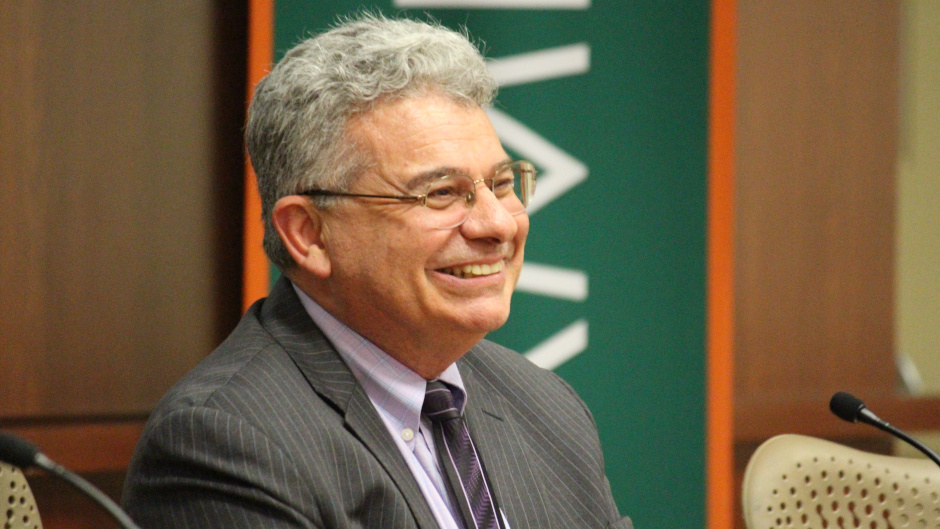“The right to property protects President Franklin D. Roosevelt’s four freedoms; it ‘helps to protect us from fear, from want, helps ensure the right to work, and to enjoy freedom of expression,’” he told an audience gathered for the 5th Annual lecture. “Jefferson just thought the ‘pursuit of happiness’ had a better ring to it than ‘the right to shop.’”
The Henkin lecture series is named in honor of the late Louis Henkin, the prominent law professor at the Columbia University School of Law who is widely considered one of the most influential contemporary scholars of human rights and inspired a whole generation of human rights lawyers, scholars, and activists. This includes professors at Miami Law - where human rights law is a strength of the curriculum.
Miami Law invited Alvarez, the Herbert and Rose Rubin Professor of International Law at New York University School of Law, to speak this year. Before entering academia, Alvarez was an attorney adviser with the Office of the Legal Adviser of the U.S. Department of State where he worked on cases before the Iran-U.S. Claims Tribunal, served on the negotiation teams for bilateral investment treaties and the Canada-U.S. Free Trade Agreement, and was the legal adviser to the administration of justice program in Latin America coordinated by the Agency of International Development.
In his lecture Alvarez explained the UN Declaration of Human Rights includes the right to property but its inclusion was very controversial at the time of the drafting due to the ideological divide of the Cold War, between democratic and capitalist countries on one side, and non-democratic socialist states, as well as certain developing states, on the other. Still to date, it is controversial to the detriment of human rights.
There is no binding treaty governing the protection of property at the global level. The regional systems of human rights protect property rights within the context of their declarations and conventions; however, there is not clear definition. That being said, it has been through the case law that the right to property has been conceptualized. The Inter-American Human Rights system has developed the right to property in relation to indigenous people, while the European system of human rights has developed the right to property in relation to the rights and freedoms of the individual.
The right to property has been developed as part of the negative obligation that protects against arbitrary expropriation and regulation of private property. However, thinking has moved forward to a positive obligation.
A former president of the American Society of International Law, a member of the Council on Foreign Relations and the Institut de Droit International, Alvarez has made substantial scholarly contributions to a wide range of subjects within international law, including the law-generating roles of international organizations, the challenges facing international criminal tribunals, and the international investment regime. Along with NYU colleague Benedict Kingsbury, Alvarez is the co-editor-in-chief of the leading peer-reviewed journal in the field, the American Journal of International Law.
Alvarez has been a special adviser on international law to the prosecutor of the International Criminal Court, an attorney adviser with the Office of the Legal Adviser of the US Department of State, and has taught at Columbia, the University of Michigan, George Washington, and Georgetown law schools. His series of lectures at The Hague Academy of International Law on the subject of foreign investment was subsequently published as The Public International Law Regime Governing International Investment (2011). His general course on public international law at the Xiamen Academy of International Law, a series of fifteen lectures delivered at China’s Xiamen University in 2013, is expected to be published as a monograph in the near future.
“From Hamilton through Henkin, immigrants with foresight have told us why the effective protection of rights, even in states with robust rule of law traditions like the U.S., requires international scrutiny,” Alvarez said.
More on human rights law at Miami Law.

